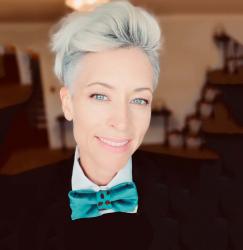
Trans Embodiment Beyond Entrapment, or, an Invitation to Compassionate Curiosity
When the mundane becomes formidable, it signals lack of access.[1]
For a trans person, it is precisely the perfunctory mechanics of the classroom that frustrate teaching and learning. This begins with introductions. The trans professor and student immediately must negotiate whether to share their name in class. Is it safe to share that information at the outset, or do we need time to build trust? Are intake forms and classroom norms enough of a safeguard?
Toilets pose another pragmatic concern. Trans teachers and students might feel pressure to map out gender-neutral or single-stall restrooms prior to class to avoid quizzical glances or worse. Depending upon the campus, these facilities might be few and far between, meaning a menstruating trans man might have to leave class for an extended period of time in order to refresh his sanitary products.
Instructors and students might be caught off guard by blatant transphobia. It arises in verbal comments, required readings, and even student papers. Syllabus policies for the prevention of misgendering classroom participants and authors of required readings is a good starting place, but it is clear that much more is needed. What trans-informed changes to institutional email addresses, for example, prevent the use of deadnames? [2]
All of these examples are especially charged when linked to religion.
The landscape is brutal: “2023 marks the fourth consecutive record-breaking year for total number of anti-trans bills considered in the U.S.”[3] Student-athletes face discrimination inside and beyond locker rooms while faculty seek equal access to restrooms and parental leave. Educators are wondering how to respond ethically.
But beware. The instrumentalization of trans embodiment as a wedge issue within political discourse, especially as linked to religion, further disenfranchises trans persons. We learned this lesson in the 1970’s when abortion was similarly leveraged as a smokescreen for racially segregating schools, subsequently polarizing American politics.[4] Anti-trans bills likewise pit one person against another, supposedly in the name of God.
To focus on the bills is to walk into a carefully set trap, allowing embodiment to be confused with essentializing materiality and reduced to identity politics.
We need to reorient the representation of trans persons beyond trans issues, in part by using resources such as the Trans Journalistic Association style guide.[5] Whatever the subject of the course, contemplating trans perspectives and reading trans scholarship is valuable. Be it ecology, the prison industrial complex, or housing access, trans persons have insightful contributions—to the study and practice of religion as much as medicine and economics.
Importantly, the onus cannot fall squarely on the instructor, especially when the instructor is trans. Many of the obstacles we face are due to the built environment, which is beyond our control. I would like to invite readers to consider what collective action might entail.
Here I propose personal and political ethical action that neither falls prey to strategic discourses of entrapment nor neglects the practicality of embodied teaching. My shorthand for this recommendation is compassionate curiosity.
In place of hypothetical scenarios, like the trolley problem or lifeboat scenario that frequent ethical inquiry, compassionate curiosity bonds classroom communities through deep soul work intended for societal transformation.[6]
Compassionate curiosity solicits us to communicate with one another and discern what is most pressing within the particularities of our contexts. There is no individual or action that can bear the weight of transphobia. We need one another.
With students and colleagues, practice compassionate curiosity by considering:
- Are there trans leaders on campus and in course material?
- What policy changes on and off campus would be worth prioritizing?
- How can we establish trans mentoring networks in religious education?
Let’s ask students what changes they would like to see on campus and how they might initiate those. Explore what is important to each particular classroom of students and also share the needs of instructors.
If the challenges that we face are systemic, our responsibility is not for individuals to hustle harder. Improving the classroom environment requires collaboration. Practicing compassionate curiosity in community equips us for personal and political ethical action.
From compassionate curiosity we learn to recognize that when the mundane becomes formidable, we are not alone; there are choruses of folks suffering particular inequity, and together we all benefit from advocating for institutional change.
[1] Access and inclusion are initial concerns, but equity is what many of us seek.
[2] Hopefully these examples also resonate with people who lactate and require places to pump, fat folks in search of adequate classroom seating, BIPOC facing microaggressions in addition to overt racism, unaccommodated disabled persons, and many more.
[3] https://translegislation.com/learn
[4] Dorothy Roberts, Killing the Black Body: Race, Reproduction, and the Meaning of Liberty, (New York: Vintage Books, 1997); Radical Reproductive Justice: Foundation, Theory, Practice, Critique, eds. Loretta Ross, Lynn Roberts, et. al, (New York: The Feminist Press at CUNY, 2017); Mihee Kim-Kort, “Racialization Meets Purity Culture: Abortion and the Criminalization Cases Confirm That it’s About Controlling Women’s Bodies and the ‘Ideal’ American Family,” Religion Dispatches, June 29, 2022; Sue Halpern, “How Republicans Became Anti-Choice,” The New York Review, November 8, 2018; Randall Balmer, “The Real Origins of the Religious Right,” Politico Magazine, May 27, 2014.
[5] https://transjournalists.org/style-guide/
[6] For more on ethical curiosity see Perry Zurn’s Curiosity and Power: The Politics of Inquiry, (Minneapolis: University of Minnesota Press, 2021). Concerning terms of engagement, see Marshall B. Rosenberg’s Nonviolent Communication: A Language of Life, (Encinitas: PuddleDancer Press, 2015).
To focus on the bills is to walk into a carefully set trap, allowing embodiment to be confused with essentializing materiality and reduced to identity politics.
WOW!! Great article